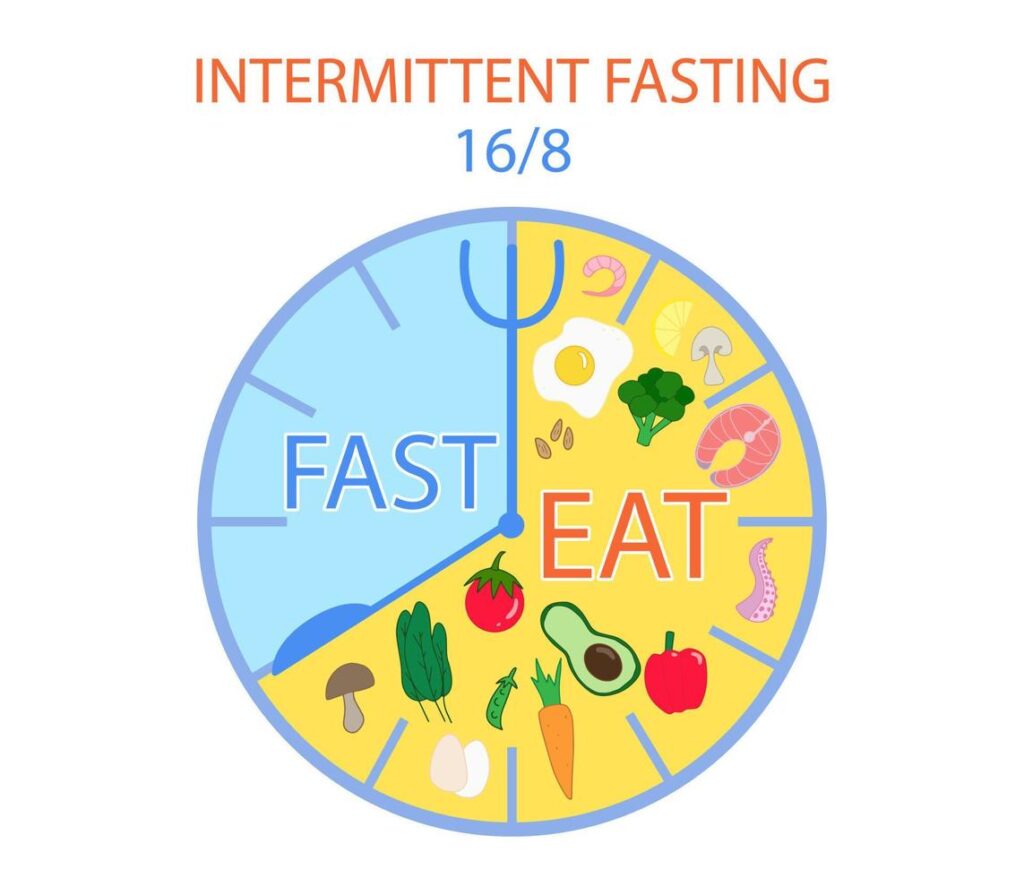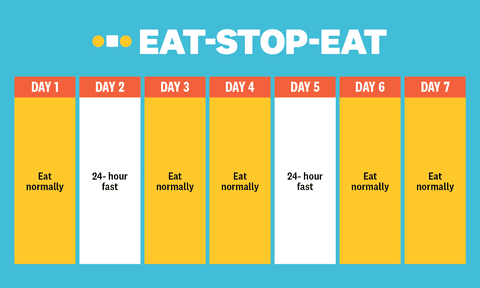Are you tired of endless diets and weight loss programs that promise quick results but leave you feeling deprived and unsatisfied?
What if there was a scientifically-backed approach to weight loss that not only helps you shed those extra pounds but also offers a multitude of health benefits?
Introducing intermittent fasting, a powerful eating pattern that has gained immense popularity in recent years.
As an expert weight loss trainer, I am here to guide you through “Intermittent Fasting 101 — The Ultimate Beginner’s Guide.” In this comprehensive article, we will delve into the fascinating world of intermittent fasting, exploring its principles, benefits, and various methods.
By the end, you will have a clear understanding of this transformative approach and be equipped with the knowledge you need to embark on your intermittent fasting journey.
Get ready to unlock the secrets to sustainable weight loss and improved well-being. Let’s dive in.
What is Intermittent Fasting?
Intermittent fasting is an eating pattern that involves alternating periods of fasting and eating. It has gained popularity for its potential to promote weight loss, improve metabolic health, and increase longevity.
Research (*) shows that intermittent fasting can lead to weight loss, lower blood pressure, and improved insulin sensitivity. It works by reducing calorie intake and triggering physiological changes that enhance fat burning and cellular repair.
However, it’s important to consult with a healthcare professional before starting intermittent fasting, as it may not be suitable for everyone. In this guide, we will explore different methods of intermittent fasting, provide practical tips for getting started, discuss potential side effects, and offer strategies for long-term sustainability.
Get ready to discover the evidence-based benefits of intermittent fasting and achieve your health and wellness goals.
How Does Intermittent Fasting Work?
Intermittent fasting has garnered attention for its effectiveness in weight loss and health improvement. But how does it work? Let’s delve into the science behind intermittent fasting and explore its mechanisms.
At its core, intermittent fasting works by manipulating the timing of when you eat, rather than focusing on specific food restrictions. By alternating between periods of fasting and eating, it triggers a series of metabolic changes in the body.
During fasting periods, when you abstain from caloric intake, several important processes occur. One of the key changes is a reduction in insulin levels. With less insulin in the bloodstream, fat cells are more readily accessed and utilized for energy.
Research (*) has shown that intermittent fasting can promote weight loss by enhancing fat burning. A study published in the Journal of Translational Medicine demonstrated that intermittent fasting led to significant reductions in body weight and body fat percentage in overweight and obese individuals.
Furthermore, intermittent fasting stimulates the production of human growth hormone (HGH), which plays a role in fat metabolism and muscle growth. Studies(*) have indicated that increased HGH levels during fasting can help preserve muscle mass while promoting fat loss.
Another important aspect of intermittent fasting is its impact on cellular repair processes. Fasting triggers a cellular response called autophagy, which involves the removal of damaged cells and the recycling of cellular components. This process promotes cellular rejuvenation and can contribute to overall health and longevity.
In addition to weight loss benefits, intermittent fasting has shown potential in improving metabolic health markers. Research published in the Journal of the American Medical Association found that intermittent fasting resulted in improved insulin sensitivity and decreased insulin levels in individuals with prediabetes.
Different Types of Intermittent Fasting
Intermittent fasting offers a flexible approach to timing your meals, and there are various methods you can choose from. Let’s explore the different types of intermittent fasting and understand how they work.
16/8 method

One popular method of intermittent fasting is the 16/8 method, which involves fasting for 16 hours and restricting eating to an 8-hour window each day. This approach has gained significant attention for its simplicity and potential health benefits. Let’s explore the 16/8 method in more detail, backed by research and evidence.
During the 16/8 method, you choose an 8-hour period in which you consume all your calories for the day, while the remaining 16 hours are dedicated to fasting. This can be achieved by skipping breakfast and starting your eating window around midday, for example, and ending it in the evening.
Research (*) suggests that the 16/8 method can be an effective strategy for weight management. A study published in the journal Nutrition and Healthy Aging showed that participants who followed the 16/8 method for 12 weeks experienced significant reductions in body weight, body fat percentage, and waist circumference. They also saw improvements in markers of metabolic health, including insulin levels and blood pressure.
The 16/8 method capitalizes on the body’s natural fasting and feeding cycles. By extending the fasting period overnight, it allows for an extended period of fat burning and metabolic regulation. Moreover, this approach may help regulate appetite and reduce overall calorie intake, contributing to weight loss.
Alternate-Day Fasting

Alternate-day fasting is a popular method of intermittent fasting that involves alternating between fasting days and regular eating days. This approach has gained attention for its potential to promote weight loss and improve various health markers. Let’s explore the concept of alternate-day fasting and the research supporting its effectiveness.
Alternate-day fasting follows a pattern of fasting for 24 hours, followed by a day of unrestricted eating. During fasting days, individuals typically consume very few calories or abstain from food altogether, allowing the body to enter a fasted state.
Research (*) studies have investigated the effects of alternate-day fasting on weight loss and metabolic health. A study published in JAMA Internal Medicine compared alternate-day fasting with daily calorie restriction for weight loss. The findings indicated that alternate-day fasting was equally effective as daily calorie restriction in reducing body weight and improving markers of cardiovascular health.
Moreover, alternate-day fasting has demonstrated benefits beyond weight loss. Research (*) conducted on animals suggests that this fasting method may have potential in extending lifespan and protecting against age-related diseases. However, more research is needed to validate these findings in humans.
It’s important to note that alternate-day fasting may not be suitable for everyone, especially those with specific medical conditions or certain dietary needs. Consulting with a healthcare professional or a registered dietitian is advisable before starting this fasting method.
If you decide to try alternate-day fasting, it is crucial to prioritize nutrient-dense meals on eating days to ensure you meet your nutritional requirements. It’s also essential to listen to your body and make adjustments as needed. For some individuals, alternate-day fasting may be challenging to sustain in the long term, while others may find it a suitable and effective approach.
5:2 Diet

The 5:2 diet, also known as the Fast Diet, is a popular form of intermittent fasting that has gained attention for its potential health benefits and weight loss effects. If you’re curious about this specific approach, let’s delve into what the 5:2 diet entails and the evidence supporting its effectiveness.
The 5:2 diet involves eating normally for five days of the week and restricting calorie intake on the remaining two days. During the fasting days, individuals typically consume only 500-600 calories, which is significantly lower than their usual intake. The concept behind this approach is that by restricting calories for two non-consecutive days, the body enters a state of fasting, promoting fat burning and other physiological changes.
Research (*) studies have explored the effects of the 5:2 diet on weight loss and metabolic health. A study published in the International Journal of Translation Medicine demonstrated that the 5:2 diet led to significant weight loss and improvements in insulin sensitivity compared to continuous calorie restriction.
Furthermore, a randomized controlled trial published in JAMA Internal Medicine revealed that the 5:2 diet was effective for weight loss and led to improvements in insulin resistance and other cardiometabolic risk factors in overweight individuals.
It’s important to note that while the 5:2 diet has shown promising results, it may not be suitable for everyone. Certain individuals, such as those with medical conditions or specific dietary requirements, should consult with a healthcare professional before embarking on this eating pattern.
Incorporating the 5:2 diet into your lifestyle requires planning and mindful eating on the fasting days. It’s crucial to focus on nutrient-dense foods to ensure you meet your nutritional needs while adhering to the calorie restriction.
Eat-Stop-Eat

Eat-Stop-Eat is a specific method of intermittent fasting that has gained popularity for its simplicity and potential health benefits. In this approach, individuals fast for a designated period, typically 24 hours, once or twice a week. Let’s delve into the details of Eat-Stop-Eat and explore the research and evidence behind its effectiveness.
During the fasting period of Eat-Stop-Eat, individuals abstain from consuming any calories for a full day. For example, they might have dinner one evening and then fast until dinner the following day. This extended fasting period allows the body to enter a state of ketosis, where it primarily uses stored fat as an energy source.
Numerous studies (*) have examined the effects of intermittent fasting methods, including Eat-Stop-Eat. Research published in the International Journey of Endocrinology demonstrated that intermittent fasting can lead to weight loss, reduced body fat, and improvements in insulin sensitivity. It found that intermittent fasting was comparable to daily calorie restriction in terms of weight loss and metabolic benefits.
The Eat-Stop-Eat method also offers flexibility in terms of food choices during non-fasting days. However, it’s important to maintain a balanced and nutritious diet to support overall health and well-being.
It’s worth noting that while Eat-Stop-Eat can be a suitable approach for some individuals, it may not be suitable for everyone. It’s crucial to listen to your body, ensure proper hydration, and consult with a healthcare professional if you have any underlying health conditions.
Warrior Diet
The Warrior Diet is a popular form of intermittent fasting that has gained attention for its unique approach to eating. If you’re curious about this eating pattern and its potential benefits, you’ve come to the right place. In this section, we will explore the Warrior Diet, its principles, and the research behind it.
The Warrior Diet takes its inspiration from ancient warrior societies, where warriors would consume a small amount of food during the day and have a large feast at night. This approach mimics the natural eating patterns of our ancestors and aligns with the concept of intermittent fasting.
The Warrior Diet follows a daily eating pattern consisting of an extended fasting period of approximately 20 hours, followed by a shorter eating window of around 4 hours. During the fasting period, small amounts of raw fruits, vegetables, and light protein sources are allowed. The main meal, known as the “feasting period,” typically takes place in the evening and allows for a more substantial intake of food.
While there is limited scientific research (*) specifically on the Warrior Diet, many of its principles align with the broader benefits of intermittent fasting. Several studies(*) have shown that intermittent fasting can lead to weight loss, improved insulin sensitivity, reduced inflammation, and enhanced cellular repair processes.
One study published in the journal Cell Metabolism demonstrated that intermittent fasting can result in increased fat oxidation, reduced insulin levels, and improved metabolic health markers.
The Warrior Diet’s extended fasting period can encourage fat burning and create a calorie deficit, which may contribute to weight loss. Additionally, the short feasting period allows for satiety and enjoyment of larger meals, which can help individuals adhere to their dietary goals.
Benefits of Intermittent Fasting
Intermittent fasting has gained significant popularity for its potential benefits beyond weight loss. In this section, we will explore the various benefits of intermittent fasting, backed by research and evidence.
1. Weight Loss:
Intermittent fasting can be an effective tool for weight management. By reducing calorie intake and promoting fat burning, it creates a calorie deficit, leading to weight loss. A systematic review and meta-analysis published in the British Journal of Nutrition found that intermittent fasting resulted in significant weight loss and reduced body fat.
Another study published in JAMA Internal Medicine showed that intermittent fasting was equally effective as daily calorie restriction for weight loss. Moreover, intermittent fasting may help preserve lean muscle mass during weight loss, as shown in a study published in Obesity.
2. Improved Insulin Sensitivity:
Intermittent fasting has been shown to enhance insulin sensitivity, which is crucial for maintaining healthy blood sugar levels. Studies (*) have indicated that intermittent fasting can reduce insulin resistance and improve glucose metabolism, potentially lowering the risk of type 2 diabetes.
A study published in the Journal of Clinical Endocrinology and Metabolism reported improved insulin sensitivity in individuals following an intermittent fasting regimen. Another study published in Cell Metabolism showed that intermittent fasting improved pancreatic function and insulin responsiveness in mice.
These findings suggest that intermittent fasting may play a role in preventing and managing insulin resistance and diabetes.
3. Cellular Repair and Autophagy:
Intermittent fasting triggers a cellular response called autophagy, where damaged cells are broken down and recycled. This process promotes cellular repair and rejuvenation, potentially delaying the onset of age-related diseases. Research published in Nature Communications highlighted the role of autophagy in health and longevity, suggesting that intermittent fasting can enhance this cellular process.
Animal studies (*) have shown that intermittent fasting activates autophagy in various organs, including the brain, liver, and muscle. Furthermore, a study published in The New England Journal of Medicine demonstrated that intermittent fasting can enhance mitochondrial function, which plays a vital role in cellular energy production and overall health.
4. Reduced Inflammation:
Chronic inflammation is associated with various health conditions, including cardiovascular disease, diabetes, and certain cancers. Intermittent fasting has been found to reduce markers of inflammation in the body.
A study published in ScienceDirect demonstrated decreased levels of inflammatory markers in individuals practicing intermittent fasting, indicating its potential anti-inflammatory effects.
Another study published in Free Radical Biology and Medicine showed that intermittent fasting reduced oxidative stress and inflammation in the brain. These findings suggest that intermittent fasting may help lower the risk of chronic inflammatory diseases and improve overall immune function.
5. Improved Brain Health:
Intermittent fasting may have positive effects on brain health and cognition. Animal studies(*) have shown that intermittent fasting can protect against neurodegenerative diseases, such as Alzheimer’s and Parkinson’s, and improve cognitive function.
Additionally, a study published in National Library of Medicine reported that intermittent fasting improved cognitive performance in older adults. Intermittent fasting has been suggested to enhance brain-derived neurotrophic factor (BDNF), a protein that promotes the growth and survival of neurons.
Furthermore, a study published in Neurobiology of Disease found that intermittent fasting improved brain function and increased the production of new nerve cells in mice.
6. Longevity:
Emerging evidence suggests that intermittent fasting may have a beneficial impact on longevity. Animal studies(*) have demonstrated that intermittent fasting extends lifespan and delays the onset of age-related diseases.
For example, a study published in Cell Metabolism showed that intermittent fasting extended the lifespan of mice. Moreover, a review published in Ageing Research Reviews discussed the potential mechanisms by which intermittent fasting may promote longevity, including improved metabolic health, reduced oxidative stress, and enhanced cellular repair processes.
While more research is needed in humans, these findings offer intriguing insights into the potential anti-aging effects of intermittent fasting.
Getting Started with Intermittent Fasting
Getting started with intermittent fasting can be an exciting and beneficial journey towards improved health and well-being. Whether you’re looking to lose weight, enhance metabolic function, or experience other potential benefits, this guide will provide you with the necessary information to embark on your intermittent fasting journey.
1. Choose the Right Intermittent Fasting Method:
There are several popular methods of intermittent fasting, and selecting the one that suits your lifestyle and preferences is crucial. The most common methods include:
a. 16/8 Method: This involves fasting for 16 hours a day and restricting you’re eating window to 8 hours. For example, you might choose to skip breakfast and eat your first meal at noon, followed by your last meal at 8 pm.
b. 5:2 Diet: This method involves consuming a normal calorie intake for five days of the week and restricting calorie intake to 500-600 calories for the remaining two non-consecutive days.
c. Eat-Stop-Eat: With this method, you fast for a full 24 hours once or twice a week, consuming no calories during the fasting period.
d. Alternate-Day Fasting: This approach involves fasting every other day, where you consume little to no calories on fasting days and eat normally on non-fasting days.
Research(*) has shown that different intermittent fasting methods can lead to similar health benefits, so choose the one that aligns with your lifestyle and goals.
2. Start Gradually:
If you’re new to intermittent fasting, it’s generally recommended to start gradually to allow your body to adjust. Begin by shortening you’re eating window or fasting for shorter durations, such as 12-14 hours, and gradually increase the fasting duration over time. This approach can help minimize discomfort and support long-term adherence to intermittent fasting.
3. Stay Hydrated:
During the fasting period, it’s important to stay hydrated by drinking water, herbal tea, or other non-caloric beverages. Hydration is essential for overall health and can help curb hunger cravings. Additionally, staying hydrated can help optimize digestion and support detoxification processes in the body.
4. Prioritize Nutrient-Dense Foods:
When it’s time to eat, focus on consuming whole, nutrient-dense foods to support your overall health and well-being. Include plenty of fruits, vegetables, lean proteins, whole grains, and healthy fats in your meals.
These foods provide essential vitamins, minerals, antioxidants, and fiber, which are crucial for maintaining optimal health and supporting your body during intermittent fasting.
5. Listen to Your Body:
Pay attention to your body’s hunger and satiety signals. Intermittent fasting is not about depriving yourself but rather developing a healthier relationship with food.
Eat until you feel satisfied, and honor your body’s needs. It’s important to distinguish between true hunger and emotional or boredom-driven cravings. Practice mindful eating by savoring each bite and being present during mealtimes.
6. Be Consistent:
Consistency is key when it comes to intermittent fasting. Stick to your chosen fasting schedule and eating window to maximize the potential benefits.
Over time, your body will adapt to the new routine, and you may experience improved energy levels, better digestion, and enhanced overall well-being. Aim to establish a consistent routine that works for you and fits well into your daily life.
7. Monitor Your Progress:
Keep track of your progress, including any changes in weight, energy levels, and overall well-being. This will help you assess the effectiveness of intermittent fasting for you and make any necessary adjustments.
Additionally, consider consulting with a healthcare professional or a registered dietitian to guide you through the process and provide personalized recommendations based on your specific needs and goals.
Common Myths and Misconceptions
Myth 1:
Intermittent fasting slows down your metabolism.
Fact 1:
One of the common concerns is that fasting for extended periods might cause the body’s metabolism to slow down. However, research suggests otherwise. A study published in the American Journal of Clinical Nutrition found that intermittent fasting did not significantly affect resting metabolic rate (1).
Another study published in Obesity Reviews concluded that intermittent fasting can enhance metabolic flexibility and improve metabolic health markers (2). While individual responses may vary, the evidence suggests that intermittent fasting does not have a detrimental impact on metabolism.
Myth 2:
Intermittent fasting causes muscle loss.
Fact 2:
Many people worry that fasting for extended periods might lead to muscle loss. However, scientific studies have shown that intermittent fasting, when combined with resistance training, can preserve or even promote muscle growth.
A study published in the Journal of Translational Medicine found that intermittent fasting, coupled with resistance training, led to an increase in lean body mass and strength in participants (3).
The key is to ensure an adequate intake of protein and maintain an active lifestyle to support muscle health during intermittent fasting.
Myth 3:
Intermittent fasting is only effective for weight loss.
Fact 3:
While weight loss is one of the primary reasons people adopt intermittent fasting, its benefits extend beyond just shedding pounds. Intermittent fasting has been shown to improve various health markers.
For instance, research published in Cell Metabolism suggests that intermittent fasting can enhance insulin sensitivity, reduce inflammation, and improve cardiovascular health (4).
Other studies have demonstrated its potential for neuroprotection and longevity (5)(6). While weight loss may be a common outcome, intermittent fasting offers a range of potential health benefits.
Myth 4:
Intermittent fasting is not safe.
Fact 4:
Intermittent fasting can be safe and well-tolerated for many individuals. However, it’s crucial to approach it responsibly and seek guidance if you have underlying health conditions or concerns.
Studies have shown that intermittent fasting, when done properly, is generally safe and does not result in adverse effects on healthy individuals (7).
However, pregnant or breastfeeding women, individuals with certain medical conditions, and those on specific medications should consult with a healthcare professional before attempting intermittent fasting.
Myth 5:
You can eat whatever you want during the eating window.
Fact 5:
While intermittent fasting does not impose strict food restrictions, it’s important to emphasize the quality of the food consumed during the eating window.
Opting for a balanced and nutrient-dense diet is key to supporting overall health and well-being.
Choosing whole foods, including fruits, vegetables, lean proteins, whole grains, and healthy fats, can provide the necessary nutrients while promoting satiety and optimal health outcomes (8).
Myth 6:
Intermittent fasting is a quick fix for all health concerns.
Fact 6:
While intermittent fasting can offer various health benefits, it should not be viewed as a universal solution for all health concerns. It is just one piece of the puzzle in achieving overall health and well-being.
A comprehensive approach that includes a balanced diet, regular physical activity, stress management, and sufficient sleep is crucial for optimal health outcomes.
Conclusion
In conclusion, intermittent fasting is a powerful approach to nutrition and health that has gained significant attention in recent years. This ultimate beginner’s guide has provided you with valuable insights and information to help you understand the concept of intermittent fasting and its potential benefits.
We explored what intermittent fasting is, how it works, and the various methods you can choose from. Intermittent fasting has been shown to promote weight loss, improve metabolic health markers, enhance insulin sensitivity, reduce inflammation, and potentially offer neuroprotective effects. It is important to note that individual results may vary, and it is always recommended to consult with a healthcare professional before making any significant changes to your diet or lifestyle.
To ensure successful intermittent fasting, we discussed practical tips such as choosing the right method that suits your lifestyle, starting gradually, staying hydrated, prioritizing nutrient-dense foods, listening to your body, being consistent, and monitoring your progress. These strategies will support your journey and help you make the most out of intermittent fasting.
It is crucial to remember that intermittent fasting is not a one-size-fits-all approach, and what works for one person may not work for another. It is essential to find a sustainable approach that aligns with your individual needs, preferences, and goals.
As you embark on your intermittent fasting journey, remember to prioritize your overall health and well-being. Intermittent fasting should be seen as a tool to support a healthy lifestyle that includes regular physical activity, adequate sleep, stress management, and a balanced diet. Incorporate intermittent fasting as part of a comprehensive approach to optimize your health and achieve your desired results.
By staying informed, listening to your body, and seeking guidance when needed, you are well-equipped to embark on this exciting journey of intermittent fasting. Embrace the potential benefits it offers, and enjoy the positive impact it can have on your health and well-being.


6 thoughts on “Intermittent Fasting 101 — The Ultimate Beginner’s Guide.”